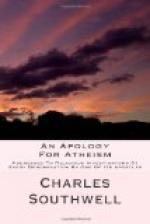be labour in vain. There is no other word in any
language whose meaning is better understood, and they
who do not under stand what it means, if such persons
there be, are not likely to understand the meaning
of any word or words whatever. Ideas of nothing
none have. That there is something, we repeat,
must be true; all dogmas or propositions being necessarily
true whose denial involves an impossibility. What
the nature of that something may be is a secondary
question, and however determined cannot affect the
primary dogma—things are things whatever
may be their individual or their aggregate nature.
Nor is it of the least consequence what name or names
we may see fit to give things, so that each word has
its fixed and true meaning. Whether, for example,
we use for the sign of that something which is, the
word Universe, or God, or Substance, or Spirit, or
Matter, or the letter X, is of no importance, if we
understand the word or letter used to be merely the
sign of that something. Words are only useful,
when they are the signs of true ideas; evidently therefore,
their legitimate function is to convey such ideas;
and words which convey no ideas at all, or what is
worse, only those which are false, should at once
be expunged from the vocabularies of nations.
Something is. The Atheist calls it matter.
Other persons may choose to call it other names; let
them. He chooses to call it this one and no other.
There ever has been something. Here again, is
a point of unity. All are equally assured there
ever has been something. Something is, something
must always have been, cry the religions, and the cry
is echoed by the irreligious. This last dogma,
like the first, admits not of being evidenced.
As nothing is inconceivable, we cannot even imagine
a time when there was nothing. Atheists say,
something ever was, which something is matter.
Theists say, something has been from all eternity,
which something is not matter, but God. They boldly
affirm that matter began to be. They affirm its
creation from nothing, by a something, which was before
the universe. Indeed, the notion of universal
creation involves first, that of universal annihilation,
and second, that of a something prior to everything.
What creates everything must be before everything,
in the same way that he who manufactures a watch must
exist before the watch. As already remarked.
Atheists agree with Theists, that something ever has
been; but the point of difference lies here. The
Atheist says, matter is the eternal something, and
asks proof of its beginning to be. The Theist
insists that matter is not the eternal something,
but that God is, and when pushed for an account of
what he means by God, he coolly answers, a Being,
having nothing in common with anything, who, nevertheless,
by his Almighty will created everything.




